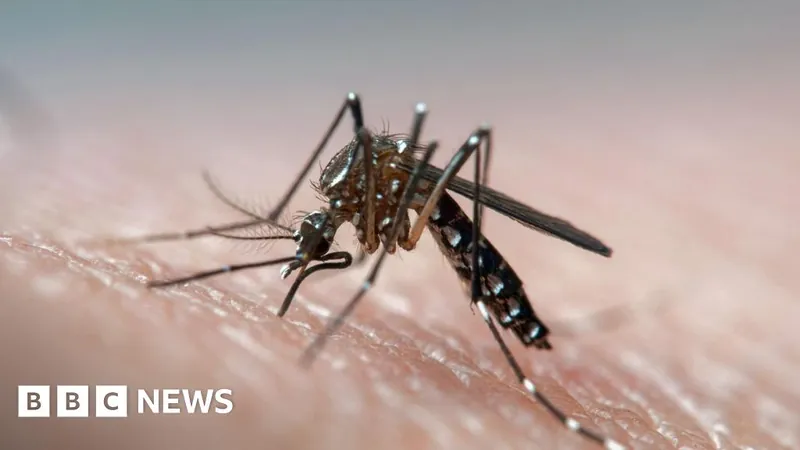
Revolutionary Method to Combat Dengue: Turning Male Mosquitoes Deaf!
2024-11-05
Author: Rajesh
Introduction
In a groundbreaking twist in the fight against mosquito-borne diseases like dengue, yellow fever, and Zika, scientists have discovered a novel strategy: rendering male mosquitoes deaf. This unique approach hinders their ability to mate, ultimately aiming to control the population of these disease-carrying insects.
Understanding Mosquito Mating Rituals
Mosquito mating rituals are intriguing; males pursue females by honing in on their wingbeats, which emit attractive sounds used as a mating call. To exploit this natural behavior, researchers from the University of California, Santa Barbara, conducted experiments that altered the genetic pathways associated with mosquito hearing. Remarkably, they rendered male mosquitoes incapable of achieving physical contact with females, even after three days cohabiting in a controlled environment.
Significance of the Research
The implications are significant, as female mosquitoes are the ones that transmit diseases to humans. By preventing them from reproducing, scientists hope to drastically reduce the overall mosquito population, thus lessening the risk of disease outbreaks. The focus of this study was on Aedes aegypti mosquitoes, notorious for spreading viruses that affect approximately 400 million people annually.
Experimental Findings
The research team meticulously observed the aerial mating behaviors of these mosquitoes, noting that mating can last anywhere from a few seconds to just under a minute. Utilizing genetic manipulation, they targeted a crucial protein known as trpVa, essential for sound perception in these insects. The result? The modified mosquitoes exhibited no response to the mating sounds produced by females. The charming serenade of potential mates fell on deaf ears!
Comparison with Wild Mosquitoes
In stark contrast, unaltered (wild) males were actively mating with females, fertilizing nearly every female within their vicinity. The findings, published in the journal PNAS, showed that the impact of the genetic modification was profound—the deaf males exhibited no mating behaviors whatsoever.
Expert Insights
Dr. Joerg Albert, a leading authority on mosquito mating behaviors from the University of Oldenburg in Germany, weighed in on the research. He described targeting male mosquitoes' sense of hearing as a compelling avenue for mosquito control, emphasizing the necessity for further study and careful management. He remarked, "The study provides the first direct molecular evidence indicating that hearing is not only important for mosquito reproduction but indeed essential. Without the ability to hear and chase acoustically, male mosquitoes might face extinction."
Broader Techniques for Mosquito Control
Additionally, scientists are investigating other techniques such as the release of sterile males into regions experiencing mosquito-borne disease outbreaks. These approaches could work in tandem with genetic alterations to create a comprehensive strategy for population control.
Ecological Considerations
While mosquitoes are often vilified for their role in spreading diseases, it's worth noting that they play a crucial part in the ecosystem. Serving as a food source for various species, including fish, birds, bats, and frogs, and acting as pollinators for certain plants, the ecological roles of mosquitoes cannot be overlooked. This complicates efforts to eradicate mosquito populations entirely, making targeted strategies like these immensely valuable.
Conclusion
Could this innovative research signal a new era in the battle against mosquito-borne diseases? Only time will tell, but it's clear that genetic engineering of our winged foes may hold the key to a healthier future.





 Brasil (PT)
Brasil (PT)
 Canada (EN)
Canada (EN)
 Chile (ES)
Chile (ES)
 España (ES)
España (ES)
 France (FR)
France (FR)
 Hong Kong (EN)
Hong Kong (EN)
 Italia (IT)
Italia (IT)
 日本 (JA)
日本 (JA)
 Magyarország (HU)
Magyarország (HU)
 Norge (NO)
Norge (NO)
 Polska (PL)
Polska (PL)
 Schweiz (DE)
Schweiz (DE)
 Singapore (EN)
Singapore (EN)
 Sverige (SV)
Sverige (SV)
 Suomi (FI)
Suomi (FI)
 Türkiye (TR)
Türkiye (TR)